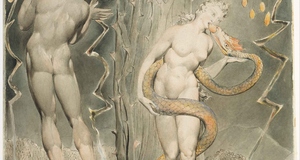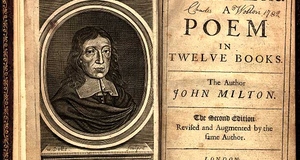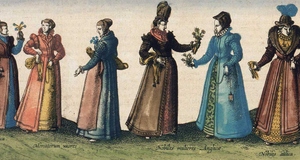The Subversion of Conventional Charisma in John Milton's Paradise Lost and Johann Wolfgang von Goethe's Faust: Part One
By
2020, Vol. 12 No. 12 | pg. 1/1 AbstractThis paper focuses on the manifestation of an unorthodox charisma in the devil figures of John Milton’s Paradise Lost and Johann Wolfgang von Goethe’s Faust: Part One. Using the respective connotations of ‘charisma’ with positive charm, and of the devil with ignobility and vice as a starting point, I explore how the intricate dispositions of Goethe’s Mephistopheles and Milton’s Satan isolate the two from the cookie-cutter stereotype of the devil, thus subverting the expectations readers hold for a wicked devil-antagonist. I propose that the display of the devils’ human mannerisms, especially when juxtaposed against the morally questionable actions of the texts’ other personas, serve to create a dissonance between the reader’s prepositioned beliefs and the actual multi-dimensional nature of the characters. The way in which the reader posits the Devil to be the embodiment of Evil is what, in turn, makes a complex devil figure charismatic, as their unanticipated ambivalence creates a shock factor that elicits sympathy, heightens interest, and fosters an unconventional charm that operates as the core of the compelling ‘charisma’ of Goethe’s and Milton’s devils. As ‘charisma’ is a positively connoted phrase, it is often natural for one to connect charisma with ideas of goodness and virtue. In literature, this could lead readers to anticipate the presence of moralistic qualities in ‘charismatic’ characters, expecting them to be honourable and heroic. However, to equate charisma with goodness is to neglect that it is possible for characters to be compelling without, necessarily, being righteous figures of morality. In fact, the ambivalence or morally dubious nature of certain characters can be precisely where their appeal lies. A prime example would be one of the most prominently recurring figures in World Literature: the Devil. In some texts, the Devil is two-dimensionally villainous, acting only as a vessel to signify the consequences of divine punishment; most famously, Dante’s Lucifer lacks character and agency, as he sits immobile in Inferno and mechanically chews on sinners. However, others present devils as intricate figures, often with human weakness and emotion, thus producing a paradoxical, and surprisingly sympathetic, satanic figure. The stereotype of the devil as the embodiment of unmitigated evil is what makes a complex devil figure interesting, as their three-dimensionality defies expectations. In Paradise Lost and Faust: Part One, John Milton’s Satan and Johann Wolfgang von Goethe’s Mephistopheles exalt charisma through their displays of vulnerability and human characteristics, as well as through their unanticipated charm when placed in contrast with the established protagonists of the two respective texts. Therefore, the two figures protest pre-existing assumptions of both ‘the devil’, and of ‘charisma’ itself, making them characters of depth and ambivalence – and thus, charismatic. In Milton’s poem, Satan’s display of human emotion deviates from the sadistic devil-stereotype, generating unexpected sympathy and relatability. In Book I, Satan awakens to the aftermath of his revolt, and assesses the plight which has befallen himself and his followers:
Immediately, there is a juxtaposition between the devil’s “cruel eye,” and the way it softens into “remorse and passion” when he regards his faithful troops (Paradise Lost I.605-6). Notably, the grief Satan demonstrates is not primarily over his own exile, but is due to the realisation that millions of his angel-followers have been banished from the “eternal splendours” of Heaven (Paradise Lost I.610). He recognises that they are forever condemned because of “his fault,” “his revolt” (Paradise Lost I.610, 612; emphasis added), since they had willingly followed him into a futile war. Satan’s acceptance of responsibility, despite that it may have been borne of his pride as a leader, nevertheless exhibits a deep compassion for his servicemen, as the syntax indicates a clear sorrow for the consequences they are now doomed to suffer. On top of the fact that he is capable of human emotion, the altruistic nature of the particular sentiments detailed here – immediate concern for the wellbeing of his troops rather than for himself – adds a layer to Satan as a humanitarian leader. Furthermore, in spite of his struggle to stay composed, Satan is moved to tears as he acknowledges that, despite their banishment, the fallen angels still stand “faithful” to their leader. The benevolence and helplessness Satan displays, given his malevolent image in widespread Christian narratives, instils a shock in readers, and his humanistic vulnerability is most of all amplified by his failure to keep these emotions under control. Thus, this explicit display of weakness, emotion, and remarkable leadership forms a stark contrast with the expected inhumanity of the devil. Aside from sympathy, this ambivalence raises a curiosity in the reader, and this intrigue is precisely what forms the crux of Satan’s charisma: though the devil’s canonical acts of sin – particularly, his temptation of Eve and divine interference – are undoubtedly to be kept in mind, this does not diminish his legitimacy as a charismatic figure, or deny the heroic virtues and leadership he displays here, which can be separate from morality. As John Steadman argues, “Many of the apparently heroic qualities that the devil displays – […] prudence as adventurer and leader – are, in fact, morally neutral […] The power of the Satanic image lies partly in its ambiguity, and this springs largely from the ambiguity of heroic virtue itself.” (255) It is difficult to withhold sympathy for this sentient character, who weeps over the loyalty of his troops, and even more difficult to deny the charisma he holds as a leader with an intriguing backstory. Meanwhile, Mephistopheles in Faust: Part One is far less solemn than Milton’s rebellious devil. Though he, too, is a complicated figure, his charisma lies in his informality and laid-back mannerisms, which alleviates the hostile response a devil figure would naturally provoke in readers. For example, he initially appears in front of Faust as a poodle. Faust, unknowingly, begins translating biblical verses out loud, granting the reader a comical scene:
Mephistopheles whining in dog form, while Faust orders him to be quiet, comes across almost as an interaction between that of a pet and its exasperated owner. The humorous torment of the poodle-devil, who is completely at Faust’s mercy, garners him sympathy, and the jocular scene relieves dramatic tension, mitigating his threatening nature as the Devil. The power dynamics between the two here foreshadow that in the Pact Scene, where the two eventually agree on Faust’s terms for a wager, and not Mephistopheles’ initial proposal. This is significant, not only because it demonstrates Mephistopheles’ reasonableness, but also because it challenges the stereotypical notion that a ‘deal with the devil’ is simply a customary ploy to manipulate humans into giving up their souls. Between his harmless presentation as a small animal, acceptance of a human’s bargain, and lowly position as a devoted servant in the contract, Mephistopheles reverses what one would expect of the power dynamics between a human and the Devil by allowing Faust to have the upper hand. When he does make a direct reference to his identity as devil, he does so light-heartedly, often in jest. For example, he expresses his dismay at the priest confiscating the jewels he had prepared for Gretchen: “May the devil take me, I would say, / If I weren’t the devil myself, by God” (Faust: Part One 12.2809-2810). By bestowing a comical element to his weighty identity, the menacing aspects of his role as devil are downplayed. In combination with his seeming innocuousness, the comic relief that his self-deprecation provides adds another layer to his affability, and further diminishes his imminent association with evil. In fact, most if not all of Mephistopheles’ actions work to soften his identity. As Mme. de Staël describes, “the author has not conceived him like a hideous phantom, such as he is usually presented […] The Mephistopheles of Goethe is a civilised Devil” (qtd. in Washington 661). While Milton’s devil generates sympathy by showing an emotive weakness, Mephistopheles appeals to readers as a sardonic, down-to-earth character, non-threatening in the way that his positioning to equal as a human, as well as his light-hearted nature, dismisses the stereotype of the devil being the incarnation of evil. The contrast between the “bully” or “lewd clown” of medieval devil figures, as Reinhard describes, who “becomes an intolerable bore to those compelled to read of his antics” (83), and the humble, entertaining Mephistopheles, who acts as servant to a human and has his plans foiled by priests, forms the basis of Mephistopheles’ charisma. Apart from the characters’ empathetic elements, the surprising contrast between the supposed ‘antagonist’ and the ‘protagonist’ also play a part in heightening the allure of Milton’s and Goethe’s devils. Paradise Lost’s main theme, Milton claims, is “to justify the ways of God to men” (2) – thus, God is canonically the protagonist of the epic, and Satan the antagonist. However, despite Milton’s words, the devil emerges as the focal point of the poem, on account of his intriguing characterisation. Critic Joakim Reinhard even goes as far as to call Satan “generally speaking […] the only interesting character in [Milton’s] epic” (84). Ironically, the ‘protagonist’ is illustrated as clinical and two-dimensional, as compared to the ambivalent rebel. Foreseeing the sins Adam and Eve will commit, God asserts that the uncompromisable price they must pay is death:
One cannot help but draw a comparison between God and Satan as leaders. Satan’s tears for the fall of his troops show an undeniable empathy; he acknowledges his culpability for their suffering. Meanwhile, God’s words, though lawful, come across as unnecessarily harsh and unfeeling, as he shows no mercy for the potential destruction of mankind. Thus, the question arises of why the omnipotent Heavenly Father, “beholding from his prospect high, / Wherein past, present, future, he beholds” (Paradise Lost III. 77-8), chooses to allow the evil actions of sin he so despises to run their own course, and enacts punishment onto creatures whom he has consciously endowed with free will, when they inevitably fall prey to temptation. In this light, God emerges as an unsympathetic ruler, who prizes the upholding of moral rules over living beings of his creation, and satirically Satan comes across as the more compassionate – and charismatic – leader of the two. In fact, in a soliloquy in Book IV, God’s omnipotence is revealed to be similarly liable for Satan’s fate. The devil acknowledges that he is stuck in a vicious cycle due to his hubris. He considers repentance: “But say I could repent” (Paradise Lost IV.93), but falls into misery as he realises repenting would only lead to a second, greater, fall, claiming “this knows my Punisher” (Paradise Lost IV.103). As his punisher and creator, the omnipotent God recognises Satan’s struggles better than any other, and is in complete knowledge of the fact that both rebellion and return will mean endless torment for the ambitious Archangel. Though Milton’s intention was presumably to show God’s absolute correctness, John Carey explains, the soliloquy ends up having the opposite effect: “paradoxically this admission redeems Satan in the reader’s eyes […] his inner debate and self-criticism reveal him as a creature of dynamic tensions, such as the other characters of the poem notably lack” (163). Satan’s helplessness, his “sheer inability to be other than he is” (Rajan qtd. in Fiore 175), endows him with an underdog element, gaining him sympathy with his honest, humane confession. In contrast, God is depicted as two-dimensionally cruel, almost tyrannical, as he is revealed to be the knowing collaborator of Satan’s misery. The soliloquy hence furthers the idea of God as cold-hearted, enhances the depth and ambivalence of Satan’s character, and puts the two in contrast with each other with Satan coming out as, surprisingly, more empathetic and charismatic. The contrast between Faust and Mephistopheles in Faust: Part One similarly frames the devil in a favourable light. Mephistopheles, although a devil, more accurately plays the devil’s advocate in the play. He does not force or deceive Faust; in his own words, he is “the spirit of perpetual negation […] I speak the modest truth, I use no art” (Faust: Part One 6.1338, 1346). And this is in fact the case; in many scenes, it is really Faust who requests from Mephistopheles a means to enact demoralising deeds. Take, for example, when Mephistopheles explains his lack of power over the innocent Gretchen. Faust, frustrated, exercises the upper hand he holds in their contract, threatening Mephistopheles:
Mephistopheles, on the other hand, is unfailingly polite and level-headed. Having to almost physically hold Faust back, he urges the “dear good sir” to “be practical” (Faust: Part One 10.2639), and describes Faust’s unrealistic demands – to have Gretchen by the end of the day – as “talking French” (Faust: Part One 10.2644-5). Shockingly, the human-protagonist’s unreasonable orders, which are borne out of unadulterated lust, comes into evident contrast with the civility the devil-antagonist continuously shows. This irony is furthered as Faust addresses Mephistopheles as “Dr. Rectitude” (Faust: Part One 10.2633), and exclaims: “Two weeks! That child? Why, I’ll be bound, / If I had even half a day / I’d not need the Devil to get my way” (Faust: Part One 10.2641-3). Faust’s words imply that his quest for Gretchen will go underway, devil or no devil. As Faust mockingly points out, in certain cases Mephistopheles even appears to demonstrate a higher level of virtue than Faust himself. This reinforces Mephistopheles’ position as the agent of negation, not the agent of evil, as he simply provides the means to an evil already existent within Faust’s mind. In fact, this notion recurs throughout the Gretchen Tragedy. Certainly, Mephistopheles offers alternate options to virtuous deeds, but it is Faust who ultimately makes the decisions which lead to tragedy: “[Mephistopheles] provides the casket which tempts Gretchen and arranges the assignation, but it is Faust who woos her; he paralyses Valentine’s arm but it is Faust who kills him; he supplies the entry to Gretchen’s prison-cell but it is Faust who gives up trying to save her” (Gray 239). Therefore, this raises the question of responsibility for the consequences of the Gretchen Tragedy: it would be inaccurate to blame Faust’s actions upon Mephistopheles, due to the fact that Faust is the one who consciously makes the series of choices which lead to the deaths of Gretchen and her family. In retrospect, when the two are drawn together in comparison, Faust, who is solely concerned with “abstract or philosophical matters” (Gray 241), comes across as irritable and aloof, causing tragedy with his own ambition and exploiting the pact that he had proposed to the Devil. It is Mephistopheles who emerges as the more civil of the two, and not the physical manifestation of evil as one would expect of a devil. The contrast, then, highlights Mephistopheles’ ambivalence, detaches him from the label of absolute evil, and solidifies his charisma. Ultimately, Milton’s Satan and Goethe’s Mephistopheles emerge as dynamic, charismatic devil figures. Through their unexpected human elements, and the contrast drawn against the respective protagonists of their texts, the two repel conventional expectations of devil figures and exhibit an ambivalent charm, thus authenticating the existence of charismatic characters of equivocal morality. ReferencesCarey, John. “Milton's Satan.”The Cambridge Companion to Milton, edited by Dennis Danielson, 2nd ed., Cambridge University Press, Cambridge, 1999, pp. 160–174. Cambridge Companions to Literature. Dante Alighieri. The Divine Comedy I: Inferno. Translated by Robin Kirkpatrick, Penguin, 2006. de Staël, Germaine. On Germany. Vol. 2, John Murray, 1814, pp. 181-185. Fiore, Amadeus P. “SATAN IS A PROBLEM: THE PROBLEM OF MILTON'S „SATANIC FALLACY‘ IN CONTEMPORARY CRITICISM.”Franciscan Studies, vol. 17, no. 2/3, 1957, pp. 173–187.JSTOR, www.jstor.org/stable/41974614. Accessed 16 Apr. 2020. Goethe, Johann Wolfgang von. Faust: Part One. Translated by David Luke, Oxford University Press, 1987. Gray, Ronald. “Goethe's ‘Faust, Part One.’”The Cambridge Quarterly, vol. 1, no. 3, 1965, pp. 237–251.JSTOR, www.jstor.org/stable/42966482. Accessed 15 Apr. 2020. Milton, John. Paradise Lost. Penguin, 1996. Rajan, Balachandra. Paradise Lost and the Seventeenth Century Reader. Oxford University Press, 1948. Reinhard, Joakim. “Goethe's Mephistopheles.”The Sewanee Review, vol. 5, no. 1, 1897, pp. 80–94.JSTOR, www.jstor.org/stable/27527918. Accessed 15 Apr. 2020. Steadman, John M. “The Idea of Satan as the Hero of ‘Paradise Lost.’”Proceedings of the American Philosophical Society, vol. 120, no. 4, 1976, pp. 253–294.JSTOR, www.jstor.org/stable/986321. Accessed 16 Apr. 2020. Washington, Ida H. “Mephistopheles as an Aristophanic Devil.”MLN, vol. 101, no. 3, 1986, pp. 659–669., doi:10.2307/2905611. Accessed 14 Apr. 2020. Suggested Reading from Inquiries Journal
Inquiries Journal provides undergraduate and graduate students around the world a platform for the wide dissemination of academic work over a range of core disciplines. Representing the work of students from hundreds of institutions around the globe, Inquiries Journal's large database of academic articles is completely free. Learn more | Blog | Submit Latest in Literature |


















